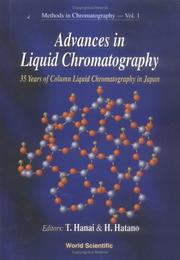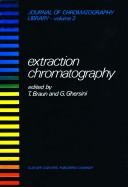| Listing 1 - 10 of 56 | << page >> |
Sort by
|

ISBN: 9812831622 9789812831620 9810219067 9789810219062 Year: 1996 Volume: v. 1 Publisher: Singapore ; New Jersey : World Scientific,
Abstract | Keywords | Export | Availability | Bookmark
 Loading...
Loading...Choose an application
- Reference Manager
- EndNote
- RefWorks (Direct export to RefWorks)
This book is a contemporary review of selected subjects in liquid chromatography, especially of the technical development, rather than the applications. The subjects are focused in the biomedical and environmental fields. This is also a troubleshooting record. Complex analytical problems such as sensitivity (sensitive detection by chemiluminescence, coulometric detection, laser based detection, necessity of degassing the system for sensitive detection), difficulty (free radical detection by Electron Spin Resonance, Polarimeter for chiral recognition) and reproducibility (packings for chiral se
Book
ISBN: 9780128093443 0128093447 0128053925 9780128053928 Year: 2017 Publisher: Amsterdam, Netherlands : Elsevier,
Abstract | Keywords | Export | Availability | Bookmark
 Loading...
Loading...Choose an application
- Reference Manager
- EndNote
- RefWorks (Direct export to RefWorks)
Book
ISBN: 1803555149 Year: 2022 Publisher: London : IntechOpen,
Abstract | Keywords | Export | Availability | Bookmark
 Loading...
Loading...Choose an application
- Reference Manager
- EndNote
- RefWorks (Direct export to RefWorks)
This book consists of several selected chapters on important subjects in modern high-performance liquid chromatography (HPLC) and ultra-performance liquid chromatography (UPLC). The content addresses aspects related to both improvements in the mainstream HPLC/UPLC technology and utilization, as well as developments of exploratory new materials and equipment. The book presents useful details about the presented subjects as well as describes new applications and/or relevant case studies for each subject. It is addressed to a large audience of analytical chemists involved in separation science. Each chapter is authored by scientists with considerable field and academic experience.
Book
ISBN: 9780323983006 0323983006 9780323999694 0323999697 Year: 2023 Publisher: Amsterdam : Elsevier Inc.,
Abstract | Keywords | Export | Availability | Bookmark
 Loading...
Loading...Choose an application
- Reference Manager
- EndNote
- RefWorks (Direct export to RefWorks)
Liquid Chromatography: Applications, Third Edition delivers a single source of authoritative information on all aspects of the practice of modern liquid chromatography. The text gives those working in academia and industry the opportunity to learn, refresh, and deepen their understanding of the field by covering basic and advanced theoretical concepts, recognition mechanisms, conventional and advanced instrumentation, method development, data analysis, and more. This third edition addresses new developments in the field with updated chapters from expert researchers. The book is a valuable reference for research scientists, teachers, university students, industry professionals in research and development, and quality control managers.
Book
ISBN: 9780323999991 0323999999 9780323999687 0323999689 Year: 2023 Publisher: Amsterdam, Netherlands : Elsevier,
Abstract | Keywords | Export | Availability | Bookmark
 Loading...
Loading...Choose an application
- Reference Manager
- EndNote
- RefWorks (Direct export to RefWorks)
Liquid Chromatography: Fundamentals and Instrumentation, Third Edition offers a single source of authoritative information on all aspects of the practice of modern liquid chromatography. The book gives those working in academia and industry the opportunity to learn, refresh, and deepen their understanding of the field by covering basic and advanced theoretical concepts, recognition mechanisms, conventional and advanced instrumentation, method development, data analysis, and more. This third edition addresses new developments in the field with updated chapters from expert researchers. The book is a valuable reference for research scientists, teachers, university students, industry professionals in research and development, and quality control managers.

ISBN: 0444998780 9786611777555 1281777552 0080858023 9780444998781 9780080858029 Year: 1975 Volume: v. 2 Publisher: Amsterdam ; New York : Elsevier Scientific Pub. Co.,
Abstract | Keywords | Export | Availability | Bookmark
 Loading...
Loading...Choose an application
- Reference Manager
- EndNote
- RefWorks (Direct export to RefWorks)
EXTRACTION CHROMATOGRAPHY
Liquid chromatography --- Chromatographie en phase liquide --- Bibliography --- Chromatography. --- -Liquid-liquid partition chromatography --- Chromatographic analysis --- Chromatographies --- Liquid chromatography. --- Bibliography. --- -Bibliography --- -Chromatographies --- Liquid-liquid partition chromatography --- Chromatography --- Actinide elements. --- Inorganic compounds. --- Rare earth metals. --- Extraction
Book
ISBN: 047192900X Year: 1976 Publisher: New York Wiley
Abstract | Keywords | Export | Availability | Bookmark
 Loading...
Loading...Choose an application
- Reference Manager
- EndNote
- RefWorks (Direct export to RefWorks)
Book
ISBN: 0128093455 0128053933 9780128093450 9780128053935 Year: 2017 Publisher: Amsterdam, Netherlands
Abstract | Keywords | Export | Availability | Bookmark
 Loading...
Loading...Choose an application
- Reference Manager
- EndNote
- RefWorks (Direct export to RefWorks)
Analytical chemistry. --- Liquid chromatography. --- Liquid-liquid partition chromatography --- Chromatographic analysis --- Analysis, Chemical --- Analytic chemistry --- Chemical analysis --- Chemistry, Analytic --- Chemistry
Book
ISBN: 1906799261 9781906799038 1906799032 9781906799267 1906799032 Year: 2010 Publisher: St Albans, Herfordshire Glendale, AZ ILM Publications
Abstract | Keywords | Export | Availability | Bookmark
 Loading...
Loading...Choose an application
- Reference Manager
- EndNote
- RefWorks (Direct export to RefWorks)
High-performance liquid chromatography has become the predominant global separation technique over the past four decades. However, the recent development of an alternative column packing material - a one-piece porous solid known as a 'monolith' - has transformed the field. Monoliths have attracted a large amount of interest due to the enhanced speed and thoroughness with which they can separate complex mixtures of biological molecules. Monoliths are porous rod structures characterised by mesopores and macropores. These pores provide monoliths with high permeability, a large number of channels
Book
ISBN: 1626187398 9781626187399 9781626186781 1626186782 Year: 2013 Publisher: Hauppauge, NY : Nova Science Publishers,
Abstract | Keywords | Export | Availability | Bookmark
 Loading...
Loading...Choose an application
- Reference Manager
- EndNote
- RefWorks (Direct export to RefWorks)
| Listing 1 - 10 of 56 | << page >> |
Sort by
|

 Search
Search Feedback
Feedback About UniCat
About UniCat  Help
Help News
News